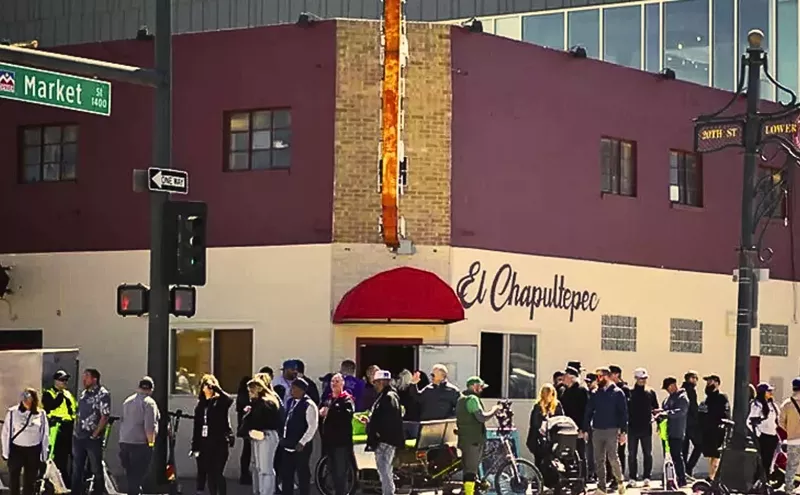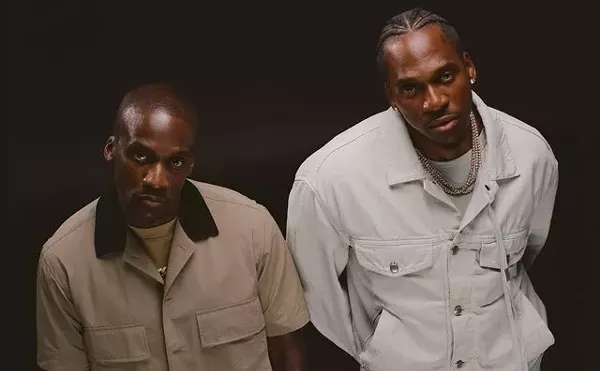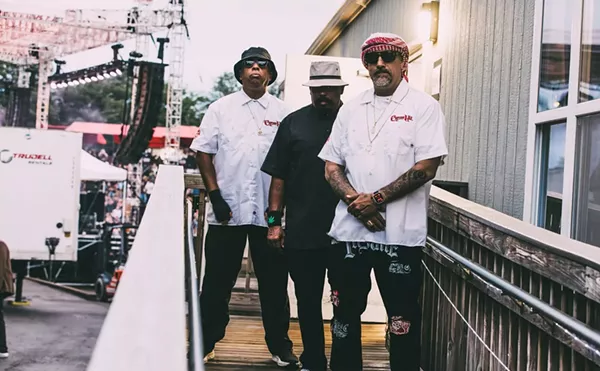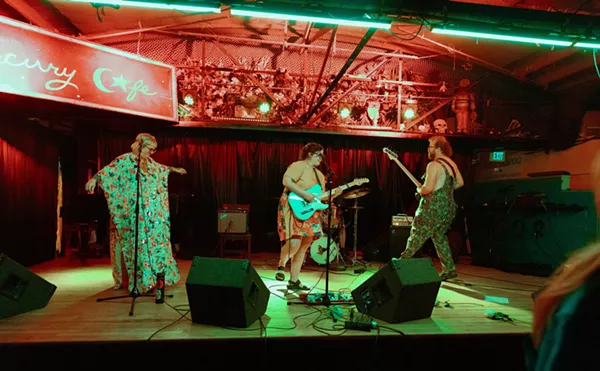Chicago is the city that most music fans probably associate with Ministry (due this Sunday, June 17, at the Ogden Theatre), and for good reason, as that's where the band got its start. Before moving to the Windy City, where the Wax Trax! label was headquartered, though, Ministry mastermind Al Jourgensen was here in Colorado. He lived in Breckenridge, went to school in Greeley, and this is where he first ran into Jello Biafra -- at a Ramones show. We recently caught up with Jourgensen, and he graciously answered our gamut of questions about everything from his time here and working with WaxTrax! to sampling Aleister Crowley and covering Bob Dylan.
Westword: How did you come to live in Denver, and what are your memories of living here early on and the artistic and musical community you found at that time?
Al Jourgensen: My family and I lived in Breckenridge when I was a teenager. I used to drive trucks through the Rockies for my father, who had an appliance company. Colorado is where I attempted a career in rodeo until my first bull-riding encounter, which didn't go so well. I attended Greeley High School, but my best memory of Colorado is my first Ramones show.
There weren't a lot of people in the audience, but Jello Biafra was there. Our first encounter -- who knew? That show also changed my entire perspective on life and music. It was definitely a catalyst and epiphany for me as an artist who hadn't figured out yet that he was an artist. Shortly thereafter, I cut my hair and moved to Chicago.
What got you started making electronic music, and what were your early inspirations for Ministry?
After leaving Colorado and moving to Chicago, I hooked up with Franke [Groovy Man] Nardiello [Thrill Kill Kult]. Franke was very entrenched in the Chicago art and music scene, and we had a band called Special Effect. We'd also performed one show as "The Carmichaels" way back in the day as well -- it was very artsy -- we played behind a scrim, so the audience couldn't see us. Then I decided to start my own band and auditioned all these singers, but no one was really the right one, so I resigned myself to being the lead singer. I never wanted to be a lead singer; I wanted to be a guitar player. But that's how it all started. Just by accident.
How did you get hooked up with WaxTrax! Records?
I worked in the record store, worked for Dannie and Jim. I slowly started infiltrating the store and setting up my recording studio in the back of the store. Then, Ministry started taking off, and Dannie and Jim brought me in. They were very open to all the crazy ideas and bands that I suggested Wax Trax! start taking on. It was very organic; it just progressed. There was no real intention at the time -- the planets just seemed to align themselves. Being at the right place at the right time and having something to bring to the table.
Did you play live shows as Ministry in Denver while you still lived here?
No. Ministry hadn't been "born" yet...
What prompted your move to Chicago, and how did you find Chicago to be in terms of what you were able to do in music, as opposed to Denver at that time?
My family moved to Chicago for business purposes, and I was still quite young at the time. Young and rebellious and rowdy. As I said, I hooked up with Franke, and things just progressed from that point forward. First Franke, then the formation of Ministry, then Wax Trax! with Dannie and Jim, then Chicago Trax, where we finally had a 24/7 studio facility, and then the sky was the limit. Chicago, at that time, was just fertile ground for artists and musicians. We probably didn't know it, but it was a community during the '80s and '90s that ended up making a huge impact on music.
With Sympathy sounds like it was very connected with a time and place where synth-pop was becoming more sophisticated than it had been previously. In what ways would you say that what you were doing was very different from other artists trying their hand at that sort of music?
Sorry, but I really do not like to talk about With Sympathy.
What triggered the shift from the sound you had on With Sympathy to the more industrial and sometimes more menacing and melancholy sounds that were to be heard on Twitch?
Probably my development as an artist, but also probably living and recording in London and Berlin and meeting and sometimes working with artists such as Jah Wobble, Lee Perry, Adrian Sherwood and the collaborations with the Wax Trax! artists such as KMFDM, Thrill Kill Kult.
Is it true that "Stigmata" appeared in the show Miami Vice? If so, how did that come about?
CBS licensed the track. One of the music supervisors is a huge Ministry fan. I think we also had a RevCo track in NCIS.
Does "Golden Dawn" include samples from recordings of Aleister Crowley and maybe Israel Regardie?
Yes!
How did you become interested in their work and/or his story?
By reading Crowley's book. Very simple. Read Crowley. Sample Crowley.
You use a sample from Ken Russell's The Devils in that song as well.
Yes
Why did you want to use that sample, and what were your impressions of that movie when you first saw it, as it's probably still pretty shocking by today's standards some forty years after the movie came out.
Because the film kicks ass. I'm a huge Ken Russell fan as well -- Altered States, Gothic. The Devils of Loudon by Aldous Huxley, the book The Devils is based on kicks ass as well.
You've worked with many talented people over the years. How did you meet and come to work with Kevin Ogilvie, and why did you want to work with him?
Ministry and Skinny Puppy kept crossing paths while we were both on tour. Ogre and I met up on a day off. We decided to collaborate. Seemed to make sense at the time. Again, just another right time, right place thing. I produced Rabies, and Ogre sang on Ministry trax and toured with us.
Mike Scaccia has been in the band for quite a while at this point. What made you want to bring him into the band at the time you brought him on board?
By the time I saw Rigor Mortis open for Death Angel in Chicago -- around 1985 or 1985, I had already made the decision that I wanted to go heavier with Ministry. I went to see Death Angel, but didn't end up staying to see their show -- instead I invited Rigor Mortis back to my place, and we partied. Scaccia and I hit it off right away, and we still do to this day. The rest is history. Mikey's my brother. They used to call us the Toxic Twins, but now these days we are the Detox Twins.
On Filth Pig, you do a cover of "Lay Lady Lay," by Bob Dylan, which some might consider an odd choice of a cover for Ministry, even though it's an excellent treatment of the song. Why did you want to cover that song in particular?
That's a long story, but basically I was in a cab with Barker in L.A. going back from Cherokee Studios when Jimmy Webb's "Wichita Lineman" cane on the radio. I told Barker: "We gotta do this song..." Barker was like: "No, Urge Overkill already did it..." So then "Lay Lady Lay" came on the radio next, and it pretty much has the same chord progression, so we landed on a Dylan cover by default.
You cover "United Forces" by Stormtroopers of Death on Relapse. Why did you cover that song, and how do you feel it fits in with the overall mood and sound of the new record?
"United Forces" by S.O.D. fits perfectly into Relapse, which is why I put it in the middle of the record. It's a kick ass song, and is still very relevant decades later. Besides, I've known Billy Milano and Scott Ian for years, so, why not?
After more than three decades in making music, what's one thing you are most proud of having done or been a part of across the breadth of your career?
That I've never drank wine without a cork.
Follow Backbeat on Twitter: @westword_music












